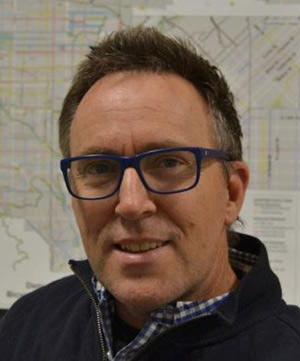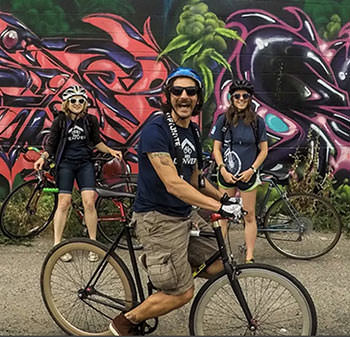victims for over 25 years.
BikeDenver: Expanding Biking in Denver One Biker at a Time
James Waddell, executive director of BikeDenver, had an epiphany about biking a few years ago. This moment with a neighbor ended up changing the way he approached other people about biking and, ultimately, the way he would lead BikeDenver.

James Waddell, Executive Director, BikeDenver
At the time, Waddell was living in Denver and commuting to Boulder for work. Often, he would ride his bike 1.6 miles to Union Station, load his bike on a bus and head to Boulder. One day while at home, he bumped into a neighbor whom he had lived next to for five years and discovered that this man was also commuting to Boulder every single day.
“We had been neighbors for five years and I had no idea,” says Waddell, who invited the man to join him on his biking routine one day. The neighbor agreed and they picked a date.
On the designated morning, the neighbor showed up in full mountain biking gear, complete with Camelback.
“The guy was so nervous!” recalls Waddell, who said that he could visibly recognize that the man was facing a huge level of anxiety over a trip that Waddell took for granted.
“We are not about the spandex warriors who are pounding up and down mountains, or the downtown bikers who ride with city traffic.”
Waddell explained what route they would take to Union Station, led the man there, helped him load his bike on the bus and the two successfully made it to Boulder. When they got off the bus in Boulder, before they went their separate ways, Waddell said his neighbor thanked him.
“His whole demeanor had changed. He was smiling and happy and excited,” says Waddell. “He told me that he had been thinking about quitting his job because the commute was so bad. Biking was going to change his life!”
That moment stuck with Waddell who, just a few months later in 2017, was hired to lead BikeDenver, a nonprofit organization dedicated to creating opportunities for people to bike safely and conveniently around the city for work, exercise or pleasure.
What Does BikeDenver Do?
 The organization was founded in 2000 by a passionate group of bikers who volunteered their time to raise awareness about the opportunities for biking in Denver and to advocate for safe biking laws and infrastructure. It was a scrappy, by-the-bootstraps, entirely volunteer-run organization.
The organization was founded in 2000 by a passionate group of bikers who volunteered their time to raise awareness about the opportunities for biking in Denver and to advocate for safe biking laws and infrastructure. It was a scrappy, by-the-bootstraps, entirely volunteer-run organization.
Then, in 2008, the New Belgium Brewery launched its Tour de Fat and made BikeDenver its nonprofit beneficiary. That partnership continued annually, ultimately enabling BikeDenver to hire three employees (two full-time and one half-time). The brewery cancelled its event in 2017 but has already announced that it is bringing Tour de Fat back in 2018 and BikeDenver will again be its beneficiary.
Last year, Waddell was hired as BikeDenver’s executive director. As he describes it, the goals of the organization have shifted since it early days.
“When BikeDenver was founded, it was the only game in town,” says Waddell. “Now there are other organizations, such as Bicycle Colorado, that are doing fantastic work advocating for biking laws and infrastructure. We wanted to shift our focus to raise awareness about how easy it is to bike around our city.”
Not About “The Spandex Warriors”
Waddell readily admits that there are some bikers who can be snobby about biking and who intimidate non-bikers into thinking that riding on two wheels is exclusively for the elite.
 “We are not about the spandex warriors who are pounding up and down mountains, or the downtown bikers who ride with city traffic,” jokes Waddell. “We’re also not a bunch of self-righteous riders who think everyone should be on a bike all the time. I’m a very practical person. For many people, riding a bike every day is not practical.
“We are not about the spandex warriors who are pounding up and down mountains, or the downtown bikers who ride with city traffic,” jokes Waddell. “We’re also not a bunch of self-righteous riders who think everyone should be on a bike all the time. I’m a very practical person. For many people, riding a bike every day is not practical.
“But, if I can help to provide opportunities for people to bike to work or bike for fun one day a week, that would be a huge shift for Denver and we could change lives!”
For example, BikeDenver has adopted “#BikeDayAnyDay” as its official hashtag. Waddell says it was a very deliberate decision not to make it “every” day. He also cites a study conducted by an urban planner in Portland, OR who found that only 3% of people are truly confident riding a bike and will ride every day in any weather. Another 6% are fairly confident but probably won’t bike in snow, for example. At the other end of the spectrum, about 30% of people are just not going to get on a bike, ever.
“In the middle – about 60% — are people who are interested but concerned,” says Waddell. “They’d like to ride but they’re really concerned about safety, they don’t know how to get from point A to point B on a bike. We focus our efforts on them.”
Now, here’s where Waddell’s epiphany comes in: just as he did with his neighbor, Waddell believes the best way to inspire biking is to create one-on-one relationships between the top 9% and the 60%.
Building Biking Relationships
BikeDenver has applied for grants to create a “navigator service,” connecting experienced bikers with people who are “interested but concerned” about biking.
“I’m describing it a bit like Uber for interested-but-concerned bikers,” says Waddell. “This program would match them up with a biker who understands how to navigate Denver on a bike and who is excited to teach a new biker to do the same.”
“Mobility is as important as affordable housing.”
BikeDenver will pay the navigators per mile to help novices.
“We are really focusing on one trip at a time and demystifying biking,” says Waddell. “There’s no technology that can achieve that. At the end of the day, it’s about people helping people.”
Additionally, BikeDenver has received federal funding to study grassroots-level barriers to biking in two Denver neighborhoods: Baker and Five Points.
“Mobility is as important as affordable housing,” says Waddell. “We want to understand the barriers to biking in communities where people may face extra challenges, such as low incomes and language barriers.”
The O’Sullivan Law Firm Supports BikeDenver
I have been a longtime supporter of BikeDenver. My family has even volunteered at some of their events over the years. More recently, I sponsored the organization’s 2018 “State of Biking” event, where we heard from many state and local experts who are working on expanding opportunities for biking.
Admittedly, my goals in supporting BikeDenver are somewhat selfish: I want my sons to be able to bike around Denver confidently and safely!
If you’d like to learn more about BikeDenver, I encourage you to visit their website at: https://bikedenver.org
Be safe out there!
See the rest of the BikeDenver: State of Biking 2018:
Part 2: Dan Raine – Senior City Planner at City and County of Denver Public Works
Part 3: Jill Locantore – Executive Director of Walk Denver
Part 4: David Sachs – Editor of Streetsblog Denver
Part 5: Q&A with Speaker Panel: Dan Raine, Senior City Planner at City and County of Denver Public Works; Jill Locantore,Executive Director of Walk Denver; David Sachs, Editor of Streetsblog Denver.
Free Consultation
Search For
Recent Articles
- Early Morning Traffic Incident in Washington Park Involves Pedestrian
- Serious Injury Reported in Early Morning Car Crash at W Virginia St and S Sheridan Blvd
- Careless Driving Incident on S Santa Fe Dr Leaves One Seriously Injured
- Pedestrian Injured in Mid-Block Crosswalk Incident in Five Points
- Serious Injury Reported After Car Strikes Tree on S Balsam Way in Marston
Categories
- Arvada
- Aurora
- Auto Accident eBook
- Auto Insurance
- Bicycle
- Bicycle/Motorcycle Accidents
- Bodily injury
- Car accidents
- Centennial
- Colorado
- Colorado Legislature
- community
- Denver
- Denver Metro Motor Vehicle Accidents
- distracted driving
- DUI Accidents
- Englewood
- Events
- Flood Insurance
- Fort Collins
- Highlands Ranch
- Hit and Run
- In The News
- insurance companies
- Lakewood
- Littleton
- Marijuana DUI
- Motorcycle Accidents
- Motorcycle Insurance
- Motorcycle Law eBook
- Motorcycles
- Newsletter
- Pedestrian
- Personal Injury Law
- Press Release
- Safe Driving
- Safety
- Scooters
- technology
- Tips
- Uncategorized
- vibrio vulnificus bacteria
- Videos
- Westminster
- Winter Driving
- Wrongful Death
Archive
- October 2025
- September 2025
- August 2025
- July 2025
- June 2025
- May 2025
- April 2025
- March 2025
- February 2025
- January 2025
- December 2024
- November 2024
- October 2024
- September 2024
- August 2024
- July 2024
- May 2024
- April 2024
- March 2024
- February 2024
- January 2024
- December 2023
- November 2023
- October 2023
- September 2023
- August 2023
- July 2023
- June 2023
- May 2023
- April 2023
- March 2023
- February 2023
- January 2023
- November 2022
- September 2022
- April 2022
- March 2022
- February 2022
- January 2022
- December 2021
- November 2021
- October 2021
- September 2021
- August 2021
- July 2021
- June 2021
- May 2021
- April 2021
- January 2021
- December 2020
- November 2020
- October 2020
- September 2020
- August 2020
- July 2020
- June 2020
- May 2020
- April 2020
- March 2020
- February 2020
- January 2020
- December 2019
- November 2019
- October 2019
- September 2019
- August 2019
- July 2019
- June 2019
- May 2019
- March 2019
- February 2019
- January 2019
- December 2018
- November 2018
- October 2018
- September 2018
- August 2018
- July 2018
- June 2018
- May 2018
- April 2018
- March 2018
- February 2018
- January 2018
- December 2017
- November 2017
- October 2017
- September 2017
- August 2017
- July 2017
- June 2017
- May 2017
- April 2017
- March 2017
- February 2017
- January 2017
- December 2016
- November 2016
- October 2016
- September 2016
- August 2016
- July 2016
- June 2016
- May 2016
- April 2016
- March 2016
- February 2016
- January 2016
- December 2015
- November 2015
- October 2015
- September 2015
- August 2015
- July 2015
- June 2015
- May 2015
- April 2015
- February 2015
- November 2014
- October 2014
- September 2014
- July 2014
- June 2014
- May 2014
- April 2014
- March 2014
- February 2014
- January 2014
- October 2012
- September 2012
- August 2012
- July 2012
- February 2012
- March 2011
- October 2010